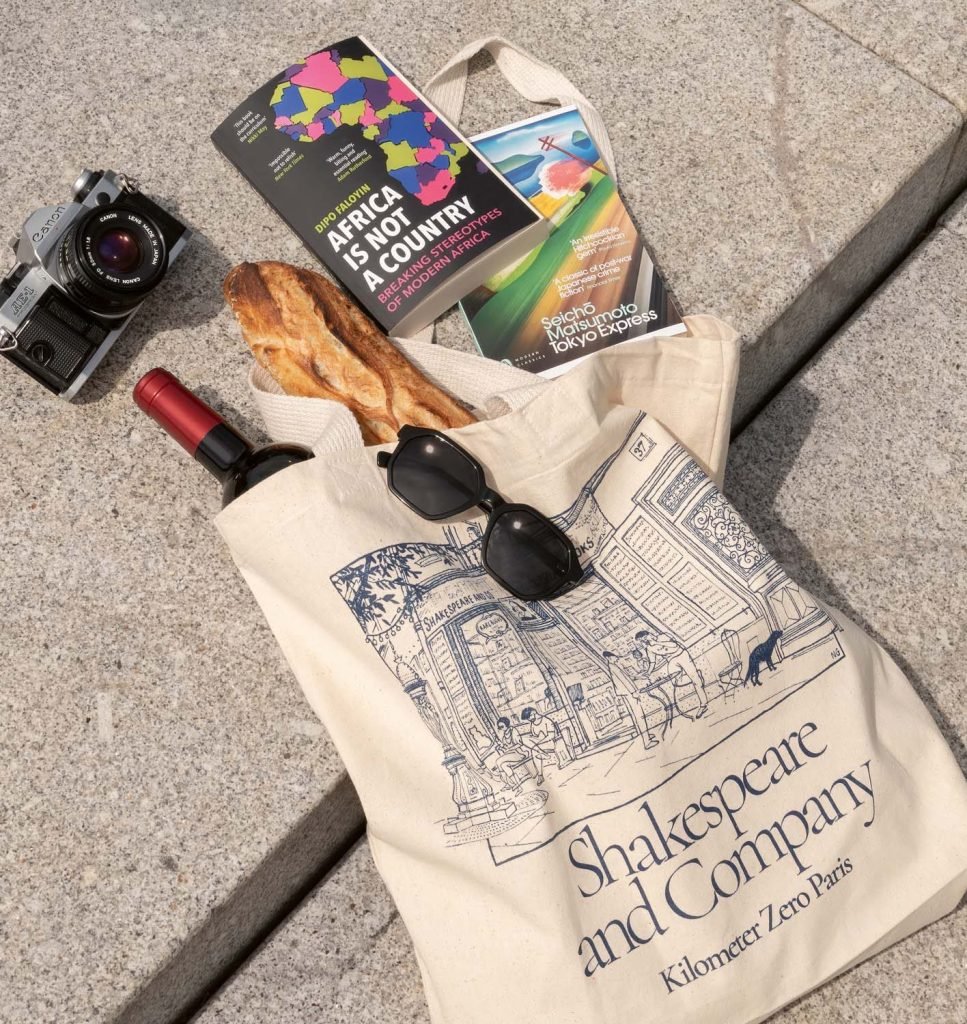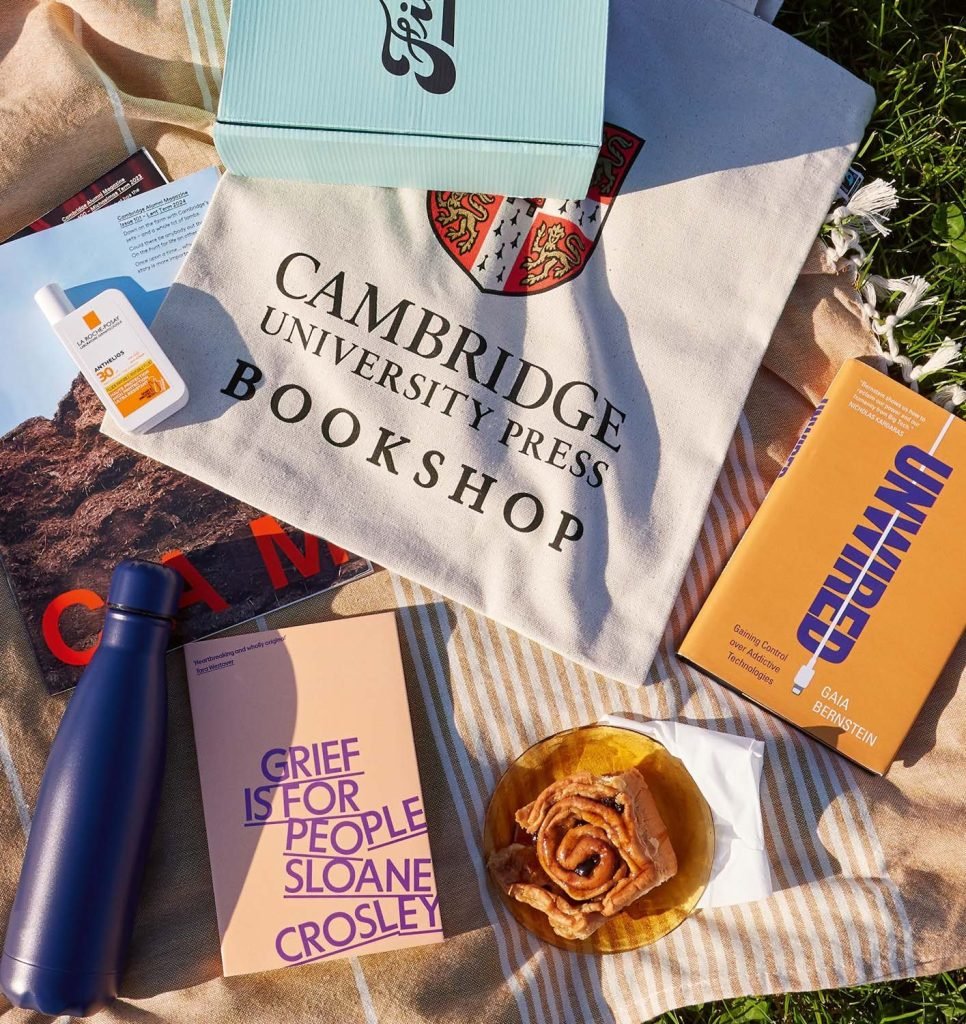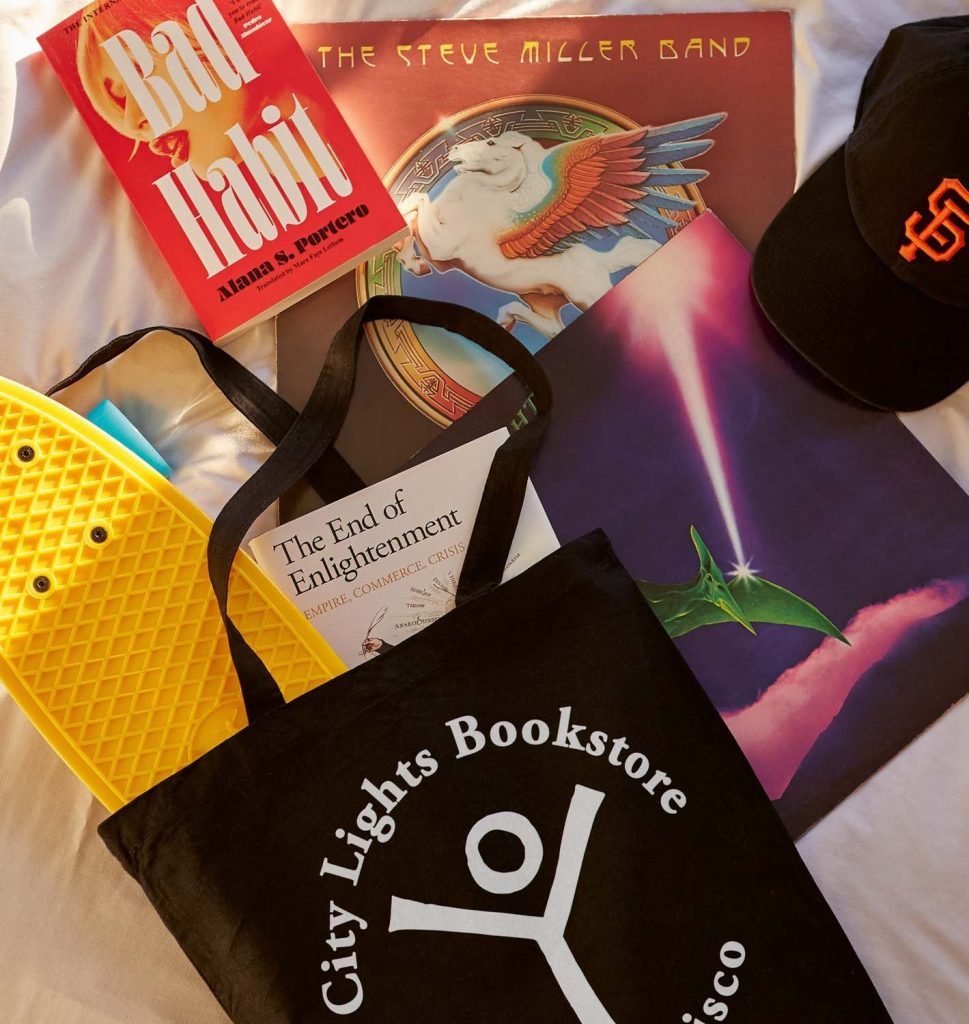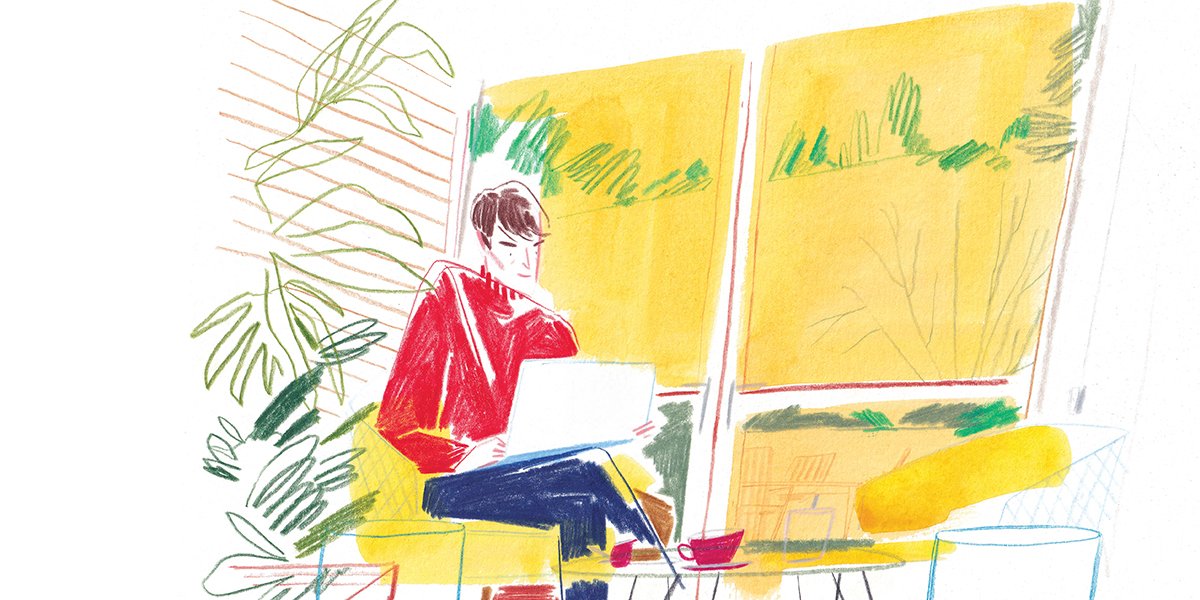Paris, France
Shakespeare and Company, 37 Rue de la Bûcherie.
This English language bookshop in Paris has been a meeting place for anglophone writers and readers since 1951.
Page-turners, eye-openers, brain-blowers. Your summer reading is here…
Cambridge students, academics and alumni share what books they will – and should – be packing in their suitcase.
Vick Hope (Emmanuel 2007)
Broadcaster, TV presenter, children’s book author and host of Women’s Prize for Fiction Podcast, Bookshelfie
I’m so keen to read Kiley Read’s debut Such a Fun Age, and her follow-up Come and Get It. I interviewed her recently, and we talked about work-life balance, which both these books discuss: it’s such an interesting topic and one that I haven’t read about much, particularly in fiction. Apparently, they are both completely unputdownable. That’s what you want from a summer read! And, of course, anything by Dolly Alderton. She’s the queen. Her books are amazing. They read like the WhatsApp friend groups I’m on and it’s so hard to reflect that in a book: they’re incredibly relatable.
I really should be reading…
The Obama autobiographies. I’m so sorry, Michelle and Barack Obama. I love you both and find your lives incredible, but both your books have been on my shelf for years. I think it’s because they’re so big and heavy. Yes, I know Kindles have special screens for when the sun is shining, but I have to hold an actual book.
Professor Robert Tombs
Professor Emeritus of French History
History is endlessly able to deepen our knowledge of the present and the past, so I’m reading works connected to the biggest and most controversial issues of today. For example, was the Enlightenment a major foundation of modern thought, or the origin of racism and colonialism? Or a bit of both? The End of Enlightenment by Richard Whatmore (Fitzwilliam 1986) examines leading Enlightenment thinkers and reveals that they themselves were aware of problems in their own time: their own doubts may help us understand our problems, too. On gender and sexuality, I’m very much looking forward to Forbidden Desire in Early Modern Europe: Male-Male Sexual Relations 1400-1750 by Noel Malcolm (Peterhouse 1974). It’s partly a story of repression and cruelty, but it’s also partly a story of what was, to some extent, culturally accepted in different parts of Europe. It looks like an extraordinary work of scholarship. And if I have any more time, I’ll read Erasure by Percival Everett – a satire on identity politics, victimhood and how you can work that system.
I really should be reading…
The Political Thought of XI Jinping by Steve Tsang and Olivia Cheung. One of the reviewers said it’s like eating sawdust, but apparently its presentation is user-friendly: it’s like a handbook where you can just dip in.
Neha Pauly
Second year Politics and International Relations, Christ’s, Cambridge Union President-Elect
I’ve been thinking a lot about the idea of grief lately, and Sloane Crosley’s memoir Grief is for People sounds fascinating: about losing her best friend to suicide and how to deal with grief. I’m currently looking into a career in investment banking, so The Trading Game by Gary Stevenson will be a must-read. It’s about his time as a young investment banker in New York: the codes, the moral conflict. My third year dissertation will challenge the concept that the British helped develop India, so my degree-related read will be Shashi Tharoor’s Inglorious Empire: What the British Did to India. And this will sound rather insane, but I’m weirdly interested to read Liz Truss’s Ten Years to Save the West – what was it like to be one of the UK’s shortest-serving prime ministers?
I really should be reading…
Kashmir: The Case for Freedom, a collection of essays by authors including Pankaj Mishra and Arundhati Roy, which discusses the struggle for independence in Kashmir and how that struggle is perceived in India’s media. I feel like it will help to give me a holistic idea of Indian issues.

Sathnam Sanghera (Christ’s 1995)
Sunday Times bestselling author of Empireland: How Modern Britain is Shaped by its Imperial Past, and Empireworld: How British Imperialism Has Shaped The Globe
I’ve spent the past few years reading about nothing but the British Empire and am now looking forward to reading other things. First up will be The Bee Sting by Paul Murray, which has been nominated for loads of prizes and sounds like the kind of comedy that’s right up my street. Then Hilary Mantel’s Beyond Black: I think she’s the best writer of our generation, and while I’ve read the Wolf Hall trilogy, I haven’t read any of her contemporary work. And anything by Jane Gardam, because I read Old Filth, which was actually a great story of empire, and I think she’s one of the best writers we have.
I really should be reading…
Anything by Charles Dickens. The closest I’ve got to him is The Muppets Christmas Carol. But Nick Hornby (Jesus 1976) wrote a great book, Dickens and Prince, comparing Charles Dickens to the singer, Prince. I’m a big Prince fan, and that made me want to read Dickens. I’m going to try A Tale of Two Cities.
Professor Giles Yeo
Professor of Molecular Neuroendocrinology and Programme Leader at the MRC Metabolic Diseases Unit
When I read on summer vacation, I like to take a brain bath and read things that don’t require a great deal of thought. I’ll be looking up anything by my favourite authors. Kim Stanley Robinson writes realistic science fiction and his Mars Trilogy has been called the best future history of all time. His most recent book, Ministry for the Future, is all about what happens when we ignore climate change. I’m a Mars freak: I love anything to do with Mars, so I’m also hoping for a new book by Andy Weir, author of The Martian. Like Robinson, he also writes science fiction with plausibility around it.
I really should be reading…
A Brief History of Time by Stephen Hawking. I’ve seen The Theory of Everything. I know he was a Cambridge man. But still it sits there on the shelf.
Professor Lord Martin Rees
Astronomer Royal, Emeritus Professor of Cosmology and Astrophysics and Co-Founder of the Centre for the Study of Existential Risk
This year, I am planning to become rather broader in my science. As an astronomer and physical scientist, my knowledge of biology is gained mainly from popular science books. Ed Yong (Pembroke 1999) is one of the best-known blogging journalists on biological topics, and he has written a very big, comprehensive and eloquent book on how nature interrelates: An Immense World. I’m also looking forward to Philip Ball’s How Life Works, which brings what we know about life up to date by exploring the most recent genetic discoveries. My main general reading is political biographies: I’m intending to read Keir Starmer: The Biography by Tom Baldwin, Rory Stewart’s Politics on the Edge and One Boy, Two Bills and a Fry Up by Wes Streeting (Selwyn 2001).
I really should be reading…
One of Neal Stephenson’s science fiction books, which are very long indeed. Or another big book: The Earth Transformed: An Untold History by Peter Frankopan (Jesus 1990) which links history to geology and climate.

Cambridge, UK
Cambridge University Press, 1-2 Trinity Street.
Covering almost every academic subject, books have been sold at 1 Trinity Street since at least 1581, making it the oldest bookshop site in the UK.
Okechukwu Nzelu (Girton 2007)
Award-winning author of The Private Joys of Nnenna Maloney and Here Again Now, and lecturer in creative writing at Lancaster University
I’m interested in writing stuff that’s set in the UK, and that often means reading around contemporary English language writers, which can leave you a bit siloed. That’s why I’m excited to read Bad Habit by Alana S Portero, translated from the Spanish by Mara Faye Lethem. It’s the story of a young trans woman living in Madrid; the prose is just beautifully poetic. I’ve also heard a lot of people discussing Anyone’s Ghost by August Thompson, which sounds so moving: I love a sad queer love story. I know there are conversations to be had about how not all queer love stories should be sad. And I think that’s valid. But I also think there’s something beautiful about exploring traumas and tragedies that happen in real life.
I really should be reading…
Love Again by Doris Lesssing. I started it and put it down and started it and put it down. It feels very noble: it’s deep and thoughtfully written. The subject matter is right up my street: love, frustration and the past. But somehow I keep getting distracted by other books.
Professor Jaideep Prabhu
Jawaharlal Nehru Professor of Indian Business and Enterprise and Director of the Centre for India and Global Business
I’m very much looking forward to Shadows at Noon: The South Asian 20th Century by Cambridge History Professor of South Asian History Joya Chatterji. It’s a fascinating book which combines memoir with a social history of the subcontinent, and I love the title. I’ll be interested to see how French writer and Nobel Prize winner Annie Ernaux also uses a mix of autofiction and sociology for her novel The Years, written from the perspective of women in modern Europe. And I keep going back to a book-length poem in rhyming couplets by another Nobel Prize winner, Caribbean poet Sir Derek Walcott, Tiepolo’s Hound, about impressionist painter Camille Pissarro. You absolutely get sucked into the beauty of the language.
I really should be reading…
The whole of Marcel Proust’s In Search of Lost Time. I have made many attempts. I love it but I’ve never gone past the first book, and I think I’ll go to my grave hanging on to the fantasy of reading it.
Niamh Howat
Third year, history, Robinson, President of Footlights
I’m longing for some post-degree escapism this summer and I’m planning to reread The Hitchhiker’s Guide to the Galaxy by Douglas Adams (St Johns 1971): I’ve only read the first couple of books, so I want to read the whole series. I’m also going to return to Alice in Wonderland by Lewis Carroll; when I was a kid, I read it with my mum, but I’d like to read it again. Also on my re-read list is the Percy Jackson series by Rick Riordan, which imagines what would happen if the Greek gods were real and here right now. I’m dyslexic and I’ve got ADHD, just like Riordan’s son. He deliberately wrote them to appeal to his son, who was finding it hard to get engaged in reading at school.
I really should be reading…
The BBC: A People’s History by David Hendy and Northerners: A History by Brian Groom, because I’m from the north, and because I’m a history student. They both look really interesting – I’ve just not had the time!

San Francisco, USA
City Lights, 261 Columbus Avenue.
A beacon for innovative writing and progressive ideals, San Francisco’s City Lights Bookstore has been a must-visit destination for international booklovers since 1953.
Professor Diane Coyle
Bennett Professor of Public Policy and Co-Director of the Bennett Institute for Public Policy
My research is on the digital economy and economic impacts of AI, and there are some interesting titles around those, such as Verity Harding’s AI Needs You: How We Can Change AI’s Future and Save Our Own and the FT’s tech correspondent Madhumita Murgia’s new book Code Dependent, examining the human impact of working in AI. Plus, I’ve seen a draft of my colleague Professor Neil Lawrence’s upcoming The Atomic Human, which looks fantastic. I’m going on holiday to Japan soon, so I’m reading Japanese detective novels like Seicho Matsumoto’s Tokyo Express.
I really should be reading…
The huge pile of politics and economics books I get sent, which currently includes Stephen Roach’s Accidental Conflict: America, China and the Clash of False Narratives and Dermot Hodson’s Circle of Stars: A History of the EU and the People Who Made It.
Tom Crewe (Fitzwilliam 2007)
Editor at the London Review of Books and winner of the Sunday Times Young Writer of the Year Award for The New Life, his first novel
The summer, with its promise of an expanse of reading time, seems the right moment to fulfil one of my resolutions for 2024: that I’ll finally read James Boswell’s Life of Johnson. (I once read an abridged version, though I only realised it was abridged afterwards and have been annoyed with myself ever since.) I usually find in practice, however, that the summer favours a slim novel, or short stories. Someone who did both very well was the British writer Elizabeth Taylor (the other Elizabeth Taylor). And indeed, a book of hers I haven’t read is called In a Summer Season, which perhaps seals the deal.
I really should be reading…
Vikram Seth’s 1500-page A Suitable Boy. I took it on holiday with me last year, only to quail before it. But in the colder months one forgets, and becomes scornful of sun-lounger laxities.
Ellen Thomas
Second year, history, President of Trinity Hall JCR
Earlier this year we had an incredible speaker at our History Society – Dipo Faloyhin, who writes on culture, race and identity. I’m planning to read his book Africa Is Not A Country: Breaking Stereotypes of Modern Africa. But I’m also very keen to practise my French, as I did it at A Level but it’s not part of my degree. So I’ve just started Beyrouth-sur-Seine by Sabyl Ghoussoub. It follows a family from Lebanon who immigrate to France. Plus, a friend gave me Agatha Christie’s Three Little Pigs to read just after exams, and it was just so good. I’m now completely hooked on Christie.
I really should be reading…
John le Carré’s Tinker Tailor Soldier Spy. I’ve watched the film so many times and I still don’t remember a single plot point. But my parents really like it, so I do intend to read it one day.
Don’t forget – alumni can get a 20 per cent discount on all full-price books at the Cambridge University Press bookshop.
 CAM
CAM

